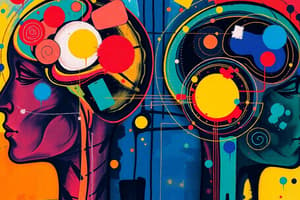Podcast
Questions and Answers
What is the definition of schema?
What is the definition of schema?
Schema is an umbrella term for mental structures that help us process and organise information around us through mental representations, which include our past experiences, culture, age and gender.
What are the types of schema?
What are the types of schema?
- Scripts
- Scripts, social schemas
- Scripts, social schemas, self-schemas
- Scripts, social schemas, self-schemas, person schemas (correct)
What are person schemas?
What are person schemas?
Mental representations about specific people.
What are social schemas?
What are social schemas?
What are self-schemas?
What are self-schemas?
What are scripts?
What are scripts?
What is a study that reveals the effect of social schemas on our perception?
What is a study that reveals the effect of social schemas on our perception?
What is the method and aim of Bartlett's 'war of the ghosts' experiment?
What is the method and aim of Bartlett's 'war of the ghosts' experiment?
What were the results of Bartlett's experiment?
What were the results of Bartlett's experiment?
What was the conclusion of Bartlett's experiment?
What was the conclusion of Bartlett's experiment?
What were some limitations to Bartlett's experiment?
What were some limitations to Bartlett's experiment?
What study aims to find the effect of context on comprehension and memory?
What study aims to find the effect of context on comprehension and memory?
What was the method of the Washing Clothes study?
What was the method of the Washing Clothes study?
What were the results and conclusions of the washing clothes study?
What were the results and conclusions of the washing clothes study?
Evaluate Bransford and Johnson's study.
Evaluate Bransford and Johnson's study.
What does schema enable us to do?
What does schema enable us to do?
Flashcards are hidden until you start studying
Study Notes
Definition of Schema
- Schema refers to mental structures that help us process and organize information around us through mental representations, including past experiences, culture, age, and gender.
Types of Schema
- Scripts: schemas about a sequence of events, such as going to work or making coffee.
- Social schemas: mental representations about various groups of people, including stereotypes.
- Self-schemas: mental representations about ourselves.
- Person schemas: mental representations about specific people.
Social Schemas and Perception
- Darley and Gross (1983) study: showed that social schemas can affect our perception, as participants judged a girl's academic performance based on her perceived socioeconomic status.
- This demonstrates how social schemas can act as a lens to interpret ambiguous information.
Bartlett's "War of the Ghosts" Experiment
- Aim: to explore how social and cultural factors can affect our schemas.
- Method: participants were asked to reproduce a Native American folk story, either through repeated reproduction or serial reproduction.
- Results:
- The story became shorter and more concise over time.
- Words were changed to reflect more culturally familiar things.
- People altered culturally unfamiliar things to make the story more understandable and fit their schemas.
Conclusion of Bartlett's Experiment
- Memory is subjective to pre-existing schemas.
- Limitations:
- Outdated study.
- Lack of specificity in instructions.
- Inconsistent time intervals between participants.
- Low internal validity.
Bransford and Johnson's "Washing Clothes" Study
- Aim: to investigate the effect of context on comprehension and memory.
- Method: participants were given a passage about washing clothes, either with or without context.
- Results:
- Participants who received context before the passage had better recall.
- Context helps activate schemas, aiding encoding and understanding.
Evaluation of Bransford and Johnson's Study
- Strengths: controlled lab setting, no ethical concerns.
- Weaknesses: low ecological validity, low generalizability due to sample of psychology students.
Function of Schema
- Enables us to make shortcuts when interpreting information, allowing for faster understanding.
Studying That Suits You
Use AI to generate personalized quizzes and flashcards to suit your learning preferences.




